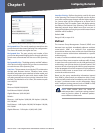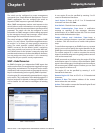
Chapter 5
Configuring the Switch
43
48-Port 10/100 + 4-Port Gigabit Switch with WebView and Power over Ethernet
Multicast > Global Settings
Multicast > Global Settings
You can configure the Switch to forward multicast
traffic intelligently. Based on the IGMP query and report
messages, the Switch forwards traffic only to the ports
that request multicast traffic. This prevents the Switch
from broadcasting the traffic to all ports and possibly
disrupting network performance.
IGMP Snooping Status When enabled, the Switch will
monitor network traffic to determine which hosts want
to receive multicast traffic. This is also referred to as IGMP
Snooping. (Default: Enabled).
Query Count Sets the maximum number of queries
issued for which there has been no response before the
Switch takes action to drop a client from the multicast
group. (Range: 2-10; Default: 2)
IGMP Query Interval Sets the frequency at which the
Switch sends IGMP host-query messages. (Range: 60-125
seconds; Default: 125)
Maximum Response Time Sets the time between
receiving an IGMP Report for an IP multicast address on
a port before the Switch sends an IGMP Query out of that
port and removes the entry from its list. (Range: 5-25
seconds; Default: 10)
MRouter Timeout The time the Switch waits after the
previous querier stops before it considers the router port
(i.e., the interface which had been receiving query packets)
to have expired. (Range: 300-500 seconds; Default: 300)
IGMP Version Sets the protocol version for compatibility
with other devices on the network. (Range: 1-2; Default:
2)
Click Save Settings to save the changes.
Multicast > Static Member Ports
Multicast > Static Member Ports
Multicast filtering can be dynamically configured using
IGMP Snooping and IGMP Query messages. For certain
applications that require tighter control, you may need
to statically configure a multicast service on the Switch.
First add all the ports attached to participating hosts to a
common VLAN, and then assign the multicast service to
that VLAN group.
Specify the interface attached to a multicast service (via
an IGMP-enabled switch or multicast router), indicate the
VLAN that will propagate the multicast service, specify the
multicast IP address, and click Add.


















